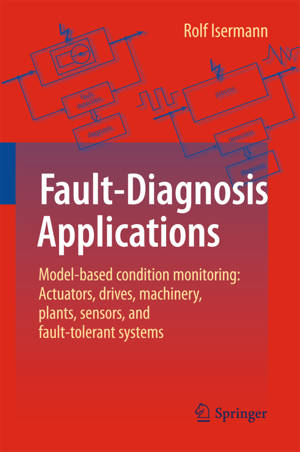
- Afhalen na 1 uur in een winkel met voorraad
- Gratis thuislevering in België vanaf € 30
- Ruim aanbod met 7 miljoen producten
- Afhalen na 1 uur in een winkel met voorraad
- Gratis thuislevering in België vanaf € 30
- Ruim aanbod met 7 miljoen producten
Fault-Diagnosis Applications
Model-Based Condition Monitoring: Actuators, Drives, Machinery, Plants, Sensors, and Fault-Tolerant Systems
Rolf IsermannOmschrijving
Supervision, condition-monitoring, fault detection, fault diagnosis and fault management play an increasing role for technical processes and vehicles in order to improve reliability, availability, maintenance and lifetime. For safety-related processes fault-tolerant systems with redundancy are required in order to reach comprehensive system integrity.
This book is a sequel of the book "Fault-Diagnosis Systems" published in 2006, where the basic methods were described. After a short introduction into fault-detection and fault-diagnosis methods the book shows how these methods can be applied for a selection of 20 real technical components and processes as examples, such as:
Electrical drives (DC, AC)
Electrical actuators
Fluidic actuators (hydraulic, pneumatic)
Centrifugal and reciprocating pumps
Pipelines (leak detection)
Industrial robots
Machine tools (main and feed drive, drilling, milling, grinding)
Heat exchangers
Also realized fault-tolerant systems for electrical drives, actuators and sensors are presented.
The book describes why and how the various signal-model-based and process-model-based methods were applied and which experimental results could be achieved. In several cases a combination of different methods was most successful.
The book is dedicated to graduate students of electrical, mechanical, chemical engineering and computer science and for engineers.
Specificaties
Betrokkenen
- Auteur(s):
- Uitgeverij:
Inhoud
- Aantal bladzijden:
- 354
- Taal:
- Engels
Eigenschappen
- Productcode (EAN):
- 9783642127663
- Verschijningsdatum:
- 8/04/2011
- Uitvoering:
- Hardcover
- Formaat:
- Ongenaaid / garenloos gebonden
- Afmetingen:
- 163 mm x 239 mm
- Gewicht:
- 771 g

Alleen bij Standaard Boekhandel
Beoordelingen
We publiceren alleen reviews die voldoen aan de voorwaarden voor reviews. Bekijk onze voorwaarden voor reviews.











